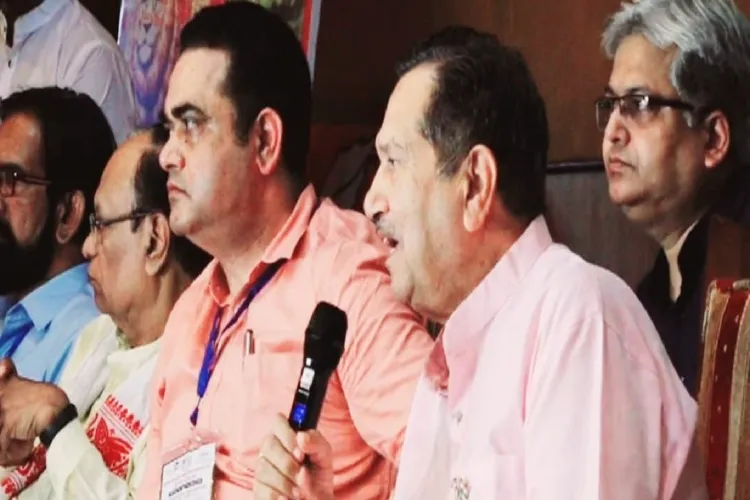
New Delhi
Indresh Kumar, RSS National Executive member and Chief Convener of Muslim Rashtriya Manch, stated that the politics dividing India faced defeat, and the politics emphasizing unity and integrity emerged victorious.
During a crucial meeting in New Delhi, the Muslim Rashtriya Manch deliberated on comprehensive development in Jammu and Kashmir, connecting it with the mainstream. It was decided that instead of perpetuating the destructive politics pursued by opposition parties for years, everyone should contribute positively to the prosperity and development of Jammu and Kashmir.
The National Media Coordinator of the Manch, Shahid Sayeed, reported that Indresh Kumar emphasized the irreversible end of Article 370, which had acted as a wall fostering separatism, conspiracy, terrorism, violence, and hatred. He highlighted the importance of an inquiry committee to investigate the large number of deaths and displacements that occurred from 1980 till now, ensuring justice for the victims, so that India, the motherland, remains undivided
Indresh Kumar expressed the shared desire for India, whether it be the RSS, BJP, or the Muslim Rashtriya Manch, always to remain undivided. He stressed the establishment of constitutional values for the defense of unity. Indresh Kumar asserted that the nation has always been united as one, emphasizing the significant step taken by the government with determination.
Indresh Kumar proudly acknowledged the sacrifices of Shyama Prasad Mukherjee and millions of others, praising the government's historic decision to integrate Jammu and Kashmir into the country's mainstream by revoking Article 370 on August 5, 2019. He credited the government for making decisions based on understanding and determination, unlike the potentially enslaving actions of Nehru's Congress.
During the Muslim Rashtriya Manch meeting, national coordinators, divisional coordinators, state coordinators, deputy coordinators, and other activists welcomed decisions made in unison. The meeting recognized that the controversial Article 370 and 35A had hindered the development and progress of Jammu and Kashmir. It was decided to replace the destructive politics of the opposition with a positive contribution to the prosperity and development of the region. The meeting emphasized the need to provide education and culture to children, reduce school dropouts, and offer better training in sports for those interested.
Members present in the meeting included Muhammad Afzal, Shahid Akhtar, Virag Pachpor, Girish Juyal, Majid Talikoti, Sayyed Raza Hussain Rizvi, Mazahir Khan, Abu Bakr Naqvi, S.K. Mudeen, Islam Abbas, Reshma Hussain, Irfan Ali Peerzada, Khursheed Razaka, Tahir Hussain, Bilal ur Rahman, Shalini Ali, Mahtab Alam, Haji Sabreen, Imran Chaudhary, Thakur Raja Rais, Tusharkant, Faiz Khan, Altamash Bihari, Keshav Patel, among more than 60 offline and online participants.
As soon as the Supreme Court stamped its approval on the government's decision, an atmosphere of celebration and joy was witnessed throughout the country, including Jammu and Kashmir. While opposition parties expressed varying opinions, the general public welcomed the decision with historical significance. People believed that those claiming injustice against the people of Jammu and Kashmir were spreading falsehoods. The public acknowledged the government and the Supreme Court for delivering justice and considered it a gift of equality, brotherhood, harmony, development, and progress. The people of Jammu and Kashmir expressed gratitude for the sacrifices made for this cause, believing that those who have given their lives for it are to be thanked.
